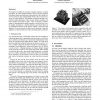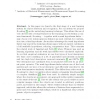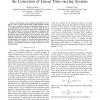209 search results - page 4 / 42 » The Computational Complexity of Weak Saddles |
HAPTICS
2011
IEEE
12 years 11 months ago
2011
IEEE
We propose extending the concept of spatial constancy to haptic perception. In vision, spatial constancy refers to the conversion of retinotopic signals into spatiotopic represent...
SIGECOM
2005
ACM
14 years 1 months ago
2005
ACM
We study various computational aspects of solving games using dominance and iterated dominance. We first study both strict and weak dominance (not iterated), and show that checki...
VIS
2008
IEEE
14 years 8 months ago
2008
IEEE
The Morse-Smale (MS) complex has proven to be a useful tool in extracting and visualizing features from scalar-valued data. However, efficient computation of the MS complex for lar...
ECCV
2004
Springer
14 years 9 months ago
2004
Springer
In this paper we describe the first stage of a new learning system for object detection and recognition. For our system we propose Boosting [5] as the underlying learning technique...
ECCTD
2011
12 years 7 months ago
2011
Abstract—In this paper, a low complexity algorithm for the design of a time-varying correction filter of finite impulse response (FIR) type is presented. Using the obtained fi...



